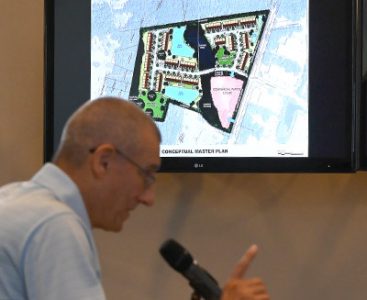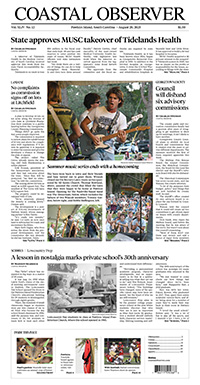Land use
Rezoning suit called ‘classic NIMBY’

Citizens who don’t like Georgetown County’s land-use decisions should turn to the ballot box, not the courts, attorneys argued this month in an effort to dismiss one of four suits against the county.
The suit by neighbors and citizens groups seeks to overturn an amendment to the “planned development” zoning for 14.4 acres on Petigru Drive that the county bought for a technology park. The county wants to sell the property to an undisclosed developer who plans 90 townhouses in the place of office and warehouse space.
“It’s a classic example of NIMBY,” Tommy Morgan, the assistant county attorney, said at a hearing in Circuit Court. “They’re bringing this lawsuit instead of using the ballot box.”
Morgan and James Gilliam, who represents the county’s nonprofit Alliance for Economic Development, argued that the suit misinterprets state law and is flawed on procedural grounds.
Cindy Person, chief counsel for Keep It Green Advocacy, who represents the plaintiffs, said the county’s characterization of the complaint was incorrect and that the hearing was not the proper place to argue the merits of the suit.
It isn’t about the politics of the issue or people who are unhappy with the zoning decisions, Person added. “It’s about the county following the law.”
It was the second time in recent weeks that Person had appeared before Judge William Seals on a zoning suit.
“This is one of several cases Ms. Person had brought against Georgetown County,” Morgan said. “This is an overarching issue that’s facing the county.”
The first suit, in January 2022, followed a zoning change to reduce the minimum lot size on property along Highway 17 south of Pawleys Island.
The property owner, who is representing himself, has argued unsuccessfully that both he and the suit should be dismissed.
Two other suits that have not come up for hearings seek to overturn the county’s approval of multi-family developments that neighbors and citizens groups say are not compatible with the land-use element of the county’s comprehensive plan.
Morgan told the court that the tech park zoning amendment has “some rather large global issues” that apply to all the suits.
“South Carolina state law is very clear,” he said, that local ordinances are presumed to be valid. “The courts have the power to invalidate an ordinance, but only where it is so unreasonable as to impair or destroy a citizen’s constitutional rights.”
The planned development for the tech park was approved in 2008 and amended in 2015. Morgan said the zoning was never challenged and even if it were incorrect, which he denied, the statute of limitations for a challenge has passed.
The plaintiffs take one section of the comprehensive plan that talks about limiting the number of new residential units in the Pawleys Island and Litchfield areas out and claim that it is binding, he said.
“That’s clearly not the case,” Morgan told the judge. “A comprehensive plan is a guideline. It’s not the controlling ordinance.”
In court documents, Morgan underlined that argument.
And, he said that the plaintiffs are wrong to claim that County Council was wrong not to follow the recommendation of the Planning Commission to deny the amendment for multi-family housing. The process that the county followed calls for the commission to make a recommendation. It doesn’t specify whether that needs to be for or against a request.
The final decision is left with the council, Morgan said.
“It’s a decision the plaintiffs just don’t like,” he said.
Gilliam called the suit a “scorched earth” tactic to stifle development.
The alliance holds title to the property, which was bought with a $950,000 loan from Santee Cooper in 2016. The county has made the payments on the loan.
He echoed Morgan’s argument about the comprehensive plan. It’s “not the law, it’s a guideline. That’s from the Supreme Court’s lips,” Gilliam told the judge. “It’s not chiseled in some sort of stone tablet.”
He suggested that if the motion to dismiss is granted, the plaintiff would be able to file an appeal and get the issue settled.
“In essence it’s a political lawsuit,” Gilliam said.
He and Morgan also argued that the approval to add multi-family housing to the planned development will meet a public need, particularly the 18 units which the county required to be designated “affordable housing” for at least five years.
“That’s something that’s really important for the county,” Gilliam said.
Person told the judge that she had asked Morgan and Gilliam to specify the grounds for their motions to dismiss after they were filed at the beginning of March.
Morgan filed his with the court the day before the hearing. Gilliam’s follow the next morning.
“I’ve never encountered this sort of 11th hour, it feels like sort of an ambush,” Person said.
Gilliam claimed that Person is executive director of the citizen group Keep It Green, which is one of the plaintiffs.
Person explained that she is director and chief counsel of Keep It Green Advocacy, a separate organization.
She also took issue with Morgan’s claim that the plaintiffs include “several activist organizations whose goals are to quash growth in certain parts of Georgetown County.” Along with Keep It Green, Preserve Murrells Inlet and the Parkersville Planning and Development Alliance are plaintiffs.
The groups are not opposed to development and support the creation of affordable housing, Person said.
“What these groups oppose is the county turning a blind eye to state law,” she added, and those are arguments for another day.
“Motions to dismiss are not vehicles to argue the merits of the case,” Person said. For the purpose of the motions, the facts in the complaint are presumed to be true.
But she added, “we have not argued and never argued that the comprehensive plan is a law.”
She disputed the arguments that her filing was flawed, and noted that the county claims the owners of two other parcels within the planned development should have been named in the suit because they could be affected by the result.
Person argued in her filings that those owners should have been included in the application for the zoning amendment.
“It’s ironic,” she said.
Seals said he would consider the arguments “and let you know something soon.”




